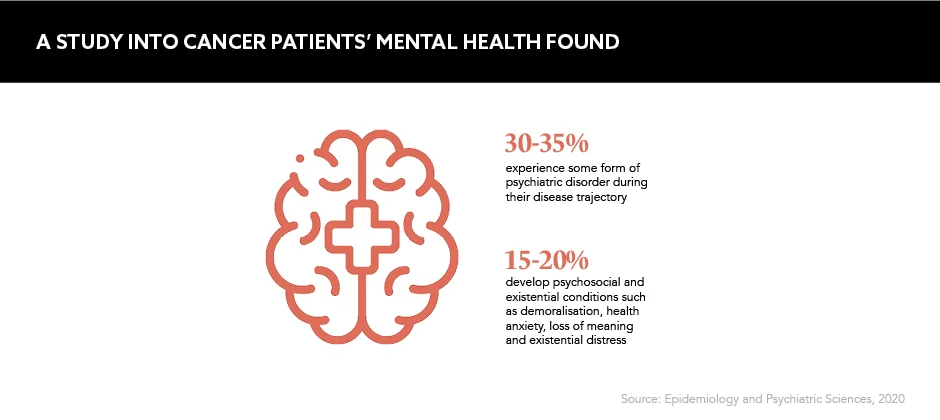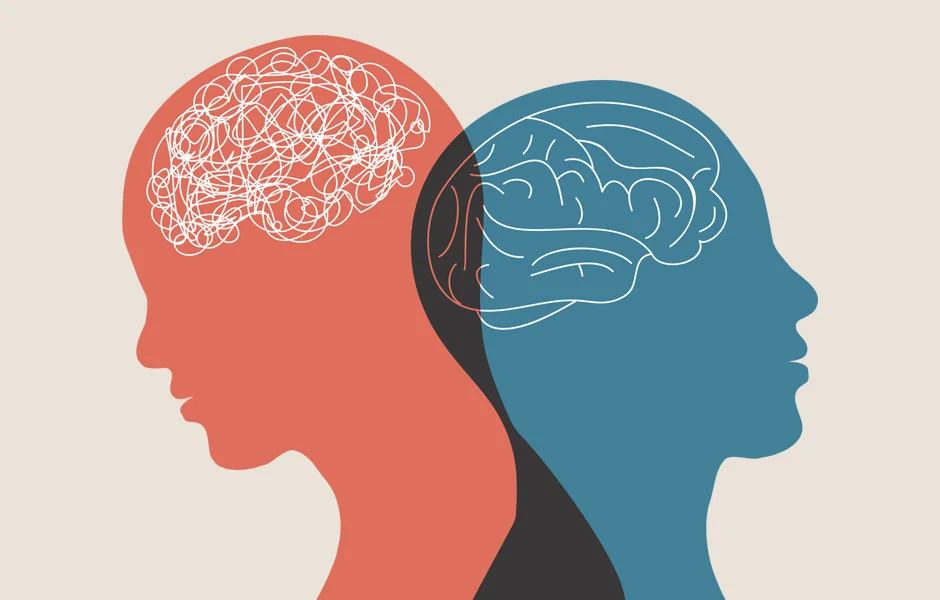Mental health must be a fundamental part of the care delivered by pharma for conditions such as cancer and HIV. Progress is being made, but how can companies push beyond new treatments to support patients in a more holistic way?
Words by Danny Buckland
A cancer diagnosis comes with a physical and psychological thump that reverberates from diagnosis, through treatment and recovery then into survivorship.
Therapies are becoming more sophisticated and successful with scientific advances decoding complex genetic functions and offering new eras of hope, yet the shadow of cancer reaches deep into the psyche and lingers.
Psychiatric disorders hit at least 30-35% of cancer patients during all phases of the disease trajectory with a spectrum ranging from anxiety and mood swings to deeper-seated psychiatric issues.
Prioritising mental health
The pharmaceutical industry continues to innovate and invest in oncology – 39% of all pipeline drugs were cancer related in 2022, according to research by Pharmaprojects – but it is also increasingly looking at ways to support patients during and beyond treatment. For example, MSD, which prides itself on pushing the boundaries of scientific cancer research, is working across multiple fronts to ease the psychological burden that patients endure.
“We are driven by the potential to bring hope to patients and know that there is much more to this than providing new treatment options alone. Around one in four cancer patients require psychological assessment and intervention, be it because of their diagnosis or the reality of living with their symptoms and treatment,” says David Long, Business Unit Director, Oncology, MSD UK. “Even 10 years after treatment, 54% of cancer survivors still experience psychological conditions.”
Around one in four cancer patients require psychological assessment
The company has created a professional development network for Clinical Nurse Specialists who provide complex, personalised care that mitigates some of the mental health pressures accompanying diagnosis and long-term cancer treatment.
MSD is, along with other pharma companies, a supporter of All.Can – a not-for-profit organisation which, driven by the insights of 4,000 patients and caregivers, is pushing for psychological wellbeing to be considered on a par with physical health throughout treatment journeys.
Understanding patient experience
Another company using the patient voice to improve its approach to mental healthcare is the global biotech BeiGene, which has launched ‘Talk About It: Cancer and Mental Health’ – a project with insights from 600 patients and cancer survivors who had struggled with mental health issues. Its aim is to better understand the mental health concerns of cancer patients and identify gaps they face when seeking proper emotional support.
“We are following the lead of those patients as we develop programmes and refine our goals,” says Maia Thrift-Perry, Global Head, Patient Advocacy and Public Health Policy, BeiGene. “Addressing cancer means understanding the whole patient – not just the biology of the disease. A cancer diagnosis can have far-reaching effects on patients, family members and caregivers, including impacts on mental health, finances, jobs and relationships. While pharma companies can’t solve broad systemic issues on their own, looking at patients holistically is a good start – and our responsibility.”
Thrift-Perry also explains that the company is committed to lending a hand to external bodies championing mental health so they can make an even greater difference with their efforts. “We see a role for BeiGene to help elevate the conversation and support those who are already doing great work in this area. Physical health and emotional wellness are inextricably linked, particularly during the cancer journey,” she says.
Beyond cancer
Cancer isn’t the only disease in which patients commonly experience mental health declines, and HIV is another prime example – largely due to prevailing societal stigma and the lack of a cure. Gilead Sciences focuses strongly on the mental health of long-term HIV patients with its ‘Find Your Four’ campaign to help people living with HIV think and talk about their wellbeing.
Researching and developing innovative treatments is a critical part of our work, but it is not all that we do
“We believe that as a healthcare company committed to creating a healthier world for everyone, we have a responsibility to consider the overall wellbeing of the people and patients we are striving to help. Researching and developing innovative treatments is a critical part of our work, but it is not all that we do,” a Gilead spokesperson says. “We look beyond our medicines, working alongside the HIV community to listen, learn and together find effective, tailored solutions to the issues those living with HIV face today.”
Support mission
The rigours of coping with cancer and other diseases were compounded by the COVID-19 pandemic when immunosuppressed patients were marginalised and treatments were delayed or cancelled. COVID-19’s corrosive influence continues to pile on anxiety and uncertainty as healthcare systems wrestle with backlogs.
Increased mental health support from pharma companies has an outcomes bonus as research has shown that stress, anxiety and depression can lead to reduced adherence to treatment and poorer outcomes. “It is not only important that we understand the challenges that people we are aiming to support face, but also that we understand how mental health and wellbeing challenges intersect with how people engage with their treatment, day-to-day management and with wider health services,” the Gilead spokesperson adds. “If we fail to understand this, we fail in our mission to support people to lead healthier lives.”
The projected statistics surrounding cancer are daunting. New cancers will peak at 29.4 million a year by 2040, up from 18.1 million in 2018, according to data from Cancer Atlas and reported by the World Health Organization, while the global market for oncology treatment is projected to exceed $400bn in 2027, according to Fortune Business Insights.
The need for pharma to play a role in every patient’s mental health and wellbeing is emerging as critical as the quest for novel, effective therapies and more responsive health delivery systems.










